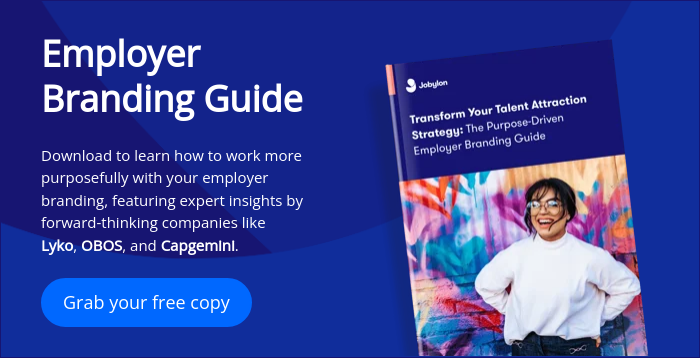Recruitment isn't just about posting a job ad and waiting for applications to roll in. The competition is fierce, and your company's reputation is crucial for attracting the best candidates. This is where the significance of employer branding cannot be overstated. According to a report, 75% of job seekers consider an employer's brand before applying for a job. But let's cut through the buzzwords. What does employer branding really mean when it comes to recruitment, and why should you invest in it? In this article, we'll break it down—from defining the concept and explaining its importance to laying out actionable steps to build your own effective employer branding strategy.

What is Employer Branding in recruitment?
When we talk about employer branding in recruitment, we're essentially focusing on the company's reputation and image as an employer. It's the narrative you craft about what it's like to work at your organization. Think of it as the story potential candidates tell themselves when they see your company name or hear about an open position. This narrative, enriched with real employee experiences, company culture, and core values, becomes the lens through which job seekers perceive your organization.
The beauty of employer branding is its authentic appeal. It's not just about selling a position but also about promoting a holistic work experience. A strong employer brand not only piques the interest of job seekers but also instills a sense of trust and reliability. When candidates believe in the story you're telling and feel aligned with your company's mission and values, they are more likely to apply, stay longer, and contribute meaningfully. It's a win-win—they find their dream job, and you secure dedicated and passionate talent.
Employer Branding and Recruitment - How does it work?
Employer branding is all about the image your company projects as a place to work. When done right, it helps attract talent and keep current employees motivated and engaged. Meanwhile, recruitment is a comprehensive method of bringing new talent on board. A smooth running process is closely aligned with a company's needs, goals, and values. But here's the key point—it won't work as effectively as possible without a strong employer brand to support it.
So, how do these two elements work in tandem? Consider your employer brand as a magnet. A powerful brand draws top-tier talent toward your organization and makes them eager to be a part of your mission. Now, combine that magnetism with an efficient recruitment process, and what do you get? A harmonious cycle where the right candidates are not only attracted to your company but are also smoothly transitioned into becoming valuable team members.
In essence, your employer brand sets the stage. It's the first impression, the initial emotional connection that job seekers form with your company. When you put your best foot forward and showcase what makes your organization a great place to work, you're not just filling vacancies—you're attracting candidates who resonate with your values and vision, making it much easier to find the perfect fit.
Why is it important to use Employer Branding in a recruitment strategy?
Infusing your recruitment strategy with employer branding isn't just a trendy buzzword exercise. It's a tangible, proven method that enhances your ability to reach and resonate with your target talent pool. Given that 50% of candidates say they wouldn't work for a company with a bad reputation even with a pay increase, it's evident that employer branding is now the cornerstone of successful hiring. Let's unpack why using employer branding in your recruitment strategy is well worth your time and resources.
- Cost-Efficiency. Reduces hiring costs by pulling in more organic, high-quality applications, eliminating the need for expensive headhunting.
- Reduced Time-to-Hire. Strong brands receive faster responses to job postings, enabling quicker hiring cycles.
- Quality of Hires. Aligning your brand with your company culture attracts candidates who resonate with your values, leading to better employee fit and longevity.
- Employee Retention. Workers are prouder and more likely to stay when they feel aligned with a company's brand and mission.
- Elevated Company Reputation. Over time, a strong employer brand fosters a reputation that not only appeals to potential candidates but also resonates with clients and partners.
- Enhanced Candidate Experience. An authentic brand leads to a consistent and positive candidate experience, from the application to the onboarding process.
- Higher Engagement. Employees sourced through a strong employer branding strategy tend to be more engaged. As a result, companies with a highly engaged workforce are 21% more profitable and 17% more productive, according to Gallup.
In a world overflowing with options and opportunities, employer branding ensures your company isn't lost in the crowd. So, if you're still on the fence about investing in employer branding, ask yourself—can you really afford not to?
How to build Employer Branding in recruitment
Now that you understand the immense value of employer branding, let's delve into how to actually build it into your recruitment process. Below are some tried-and-true tips to help you elevate your employer branding game and make your recruitment strategy truly shine.
1. Understand your current reputation
Before you start crafting your brand, take a moment to assess where you currently stand. Survey your employees, analyze feedback from past candidates, and check online platforms where employees leave reviews. Consider using social listening tools to monitor mentions of your brand online. This gives you an idea of the current perception and lets you address any concerns or misconceptions.
2. Leverage employee testimonials
Nothing resonates more than the voice of your own team. Encourage your current employees to share their experiences and testimonials, which you can feature on your career page or social media platforms. Real stories humanize your company and make it relatable. Trust us, prospective candidates pay attention to what your employees are saying.
3. Maintain an active online presence
Don’t just rely on job boards. Create value by maintaining an active online presence through blogs, podcasts, or webinars that align with your industry and company culture. Also, use platforms like LinkedIn, Twitter, and Instagram to amplify your brand presence. Share behind-the-scenes looks, celebrate milestones, and even spotlight current employees to offer a comprehensive view of your organization.
4. Ensure consistent messaging across platforms
Whether it's on your website, social media, or job boards, ensure the message about your company culture and values is consistent. A uniform brand image ensures clarity and leaves no room for misunderstandings.
5. Tailor the job descriptions
Let’s not underestimate the power of well-crafted job ads. Make it vibrant, inclusive, and aligned with your brand voice. Doing so will ensure that you’re not just listing a job, but you’re setting the stage for a meaningful relationship between potential candidates and your organization.
6. Showcase your values and benefits
Employer branding is not just about slick marketing—it's about substance. Highlight the unique benefits you offer and make your company values front and center. Whether it’s your commitment to work-life balance or employee development programs, make it clear what sets you apart. Consider using visual elements like videos or infographics to capture the essence of your company culture, giving potential candidates a tangible feel of what to expect and why they should be interested.
7. Focus on onboarding
First impressions are everything. A well-structured onboarding process not only helps new hires to acclimate quickly but also solidifies your brand image from day one. Make sure that your employer brand is integrated into this crucial phase.
8. Use data and analytics to measure and tweak
What gets measured gets improved. Use analytics to track key performance indicators such as application rates, offer acceptance rates, and employee turnover rates. Data gives you the insights needed to continually refine your employer branding strategy.
Measuring the ROI of Employer Branding in recruitment
Understanding the return on your employer branding investment is not just about crunching numbers but also about ensuring that your time, resources, and energy are paying off. Without evaluating the ROI, you could be pouring resources into strategies that don't align with your desired outcomes. Remember, your employer brand is pivotal in attracting and retaining top talent, so knowing its impact is essential for continuous refinement.
To effectively measure the ROI of employer branding in your recruitment, begin by tracking metrics like cost-per-hire, time-to-hire, and quality of hire before and after implementing your branding initiatives. Use these baseline figures to gauge the tangible benefits your employer brand brings in terms of reduced hiring expenses and quicker fill times for roles.
Don't forget to evaluate the qualitative aspects too. Conduct employee satisfaction surveys and measure engagement levels to identify the softer returns, such as improved work culture and better employee retention. By taking a holistic approach to ROI, you'll not only validate the resources spent but also fine-tune your strategies for even better results down the line.
Conclusion
In an increasingly competitive arena for securing top-notch talent, having a robust employer branding strategy is a must-have. Your employer brand acts as both a magnet and a filter, drawing in candidates who align with your values and vision, thereby making your hiring process more efficient and effective. This isn't just about reducing time-to-hire or cutting costs but also about building a team that genuinely fits and enriches your company culture. If you've been hesitant to invest in employer branding, consider this your wake-up call. The right talent won't just find you—you have to make yourself findable, attractive, and worth sticking around for.





